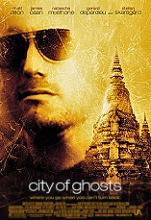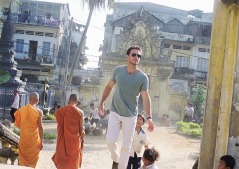|
City of Ghosts
|
| |
 |
USA, 2002. Rated R. 116 minutes.
Cast:
Matt Dillon, James Caan, Stellan Skarsgård, Natascha McElhone, Gérard
Depardieu, Sereyvuth Kem, Rose Byrne, Shawn Andrews, Chalee Sankhavesa,
Christopher Curry
Writers: Matt Dillon, Barry Gifford
Music: Tyler Bates
Cinematographer: Jim Denault
Producers: Willi Baer, Michael Cerenzie, Deepak Nayar
Director: Matt Dillon
LINKS
|
 ity
of Ghosts is what happens when a film is inspired by a location and not
a story idea or a character. Most such films focus on atmosphere at the expense
of a not well-thought-out plot. There are brilliant exceptions (Session
9), but most of the time, it's like visiting a restaurant for the ambiance
and not the food. You may enjoy the sights, sounds, and service, but at the
end of the evening you still go home with lumpy stew sitting in your belly.
ity
of Ghosts is what happens when a film is inspired by a location and not
a story idea or a character. Most such films focus on atmosphere at the expense
of a not well-thought-out plot. There are brilliant exceptions (Session
9), but most of the time, it's like visiting a restaurant for the ambiance
and not the food. You may enjoy the sights, sounds, and service, but at the
end of the evening you still go home with lumpy stew sitting in your belly.
City of Ghosts is best described as a film shot in Cambodia. Given Cambodia's
bloody recent history, it's more remarkable for that than for being the directorial
debut of Matt Dillon, who also stars. Cambodia is the film's raison d'être.
It is the first Western feature to be filmed entirely (almost) in Cambodia since
Lord Jim in 1964.
Some background is in order. Cambodia has probably endured the most appalling
half century of any country since the Middle Ages. This includes Hitler's Germany
and Stalin's Soviet Union. Since independence from the French in 1953, Cambodia
has experienced numerous coups substituting one murderous government for another,
invasions and bombings, and the extermination of a quarter of its people. The
apex of death and destruction occurred under Pol Pot's Khmer Rouge, which upon
assuming power in 1975 immediately relocated Cambodia's entire urban population
to the countryside in an effort to create the perfect, self-sufficient agrarian
communist society.  Ethnic
minorities were shot. Dissenters were shot. Families of dissenters were shot.
People who might one day be dissenters were shot. Estimates vary, but between
1975 and 1979, famine and staggeringly widespread executions accounted for some
two million deaths, out of a population of just eight million.
Ethnic
minorities were shot. Dissenters were shot. Families of dissenters were shot.
People who might one day be dissenters were shot. Estimates vary, but between
1975 and 1979, famine and staggeringly widespread executions accounted for some
two million deaths, out of a population of just eight million.
This history, never explicitly referenced but palpable in every frame, is why
Phnom Pehn is a city of ghosts. When Dillon visited Cambodia he felt compelled
to shoot something there, and it's not hard to see why. Phnom Pehn and its environs
are a breathtakingly beautiful yet tragically worn-down place, much of it abandoned
and near collapse. Everywhere you look there is evidence of past vitality and
current decay. Dillon himself puts it best, "On one hand, there is a fantastical,
hallucinatory, fairytale-like quality there among the ancient temples, stupas,
and royal palaces. But there is also a malevolence and a sense of danger lurking
just under the surface."
Dillon wanted to portray a character who undergoes a spiritual transformation
in this context, but the story is plagued by vagueness and indirection. Dillon
is Jimmy Cremming, a front man for a U.S. insurance scam set up by his longtime
mentor, Marvin (James Caan doing his benign but corrupt thing), who resides
in Southeast Asia. When numerous claims against their fraudulent coverage pour
in after a hurricane, Jimmy flees to go look for Marvin. Along the way he meets
up with Marvin's treacherous business partner Casper (Stellan Skarsgård, able
as always), the beguiling Sophie (Natascha McElhone), and friendly bartender/hotel
owner Emile (Gérard Depardieu, for some unfathomable reason). Assorted alcoholic
Western expats, petty criminals, and inscrutable Cambodian ex-Somebodies also
step into Jimmy's path, as does selfless cyclo driver Sok (novice actor Sereyvuth
Kem, an actual Phnom Pehn moto taxi driver), who comes to represent the good
side of the Cambodia. It needs representing.
The somnolent thriller languorously proceeds with little sense of purpose as
the thematic threads unwind, unravel, and slip through Dillon's fingers unknitted.
His transformation theme arises when at a certain point Marvin declares, "You're
the way you're going to be for the rest of your life." Despite Dillon's desire
to rebut that statement, Jimmy doesn't seem to undergo much internal turmoil
even as he considers making different kinds of choices. This may be the fault
of Dillon's insufficiently nuanced performance, which doesn't communicate anything
more subtle than basic emotions like anger and confusion. The compelling setting
distracts from the nuts and bolts of the plot anyway. In the end the images
of Cambodia are what you'll hold onto as you walk out of the theater. They're
almost as memorable as the sight of the shockingly enlarged Depardieu. Now there's
a man who visits restaurants regardless of the quality of ambiance or food.
Review
© April 2003 by AboutFilm.Com and the author.
Images © 2002 Metro-Goldwyn-Mayer Studios, Inc. All Rights Reserved.

 Ethnic
minorities were shot. Dissenters were shot. Families of dissenters were shot.
People who might one day be dissenters were shot. Estimates vary, but between
1975 and 1979, famine and staggeringly widespread executions accounted for some
two million deaths, out of a population of just eight million.
Ethnic
minorities were shot. Dissenters were shot. Families of dissenters were shot.
People who might one day be dissenters were shot. Estimates vary, but between
1975 and 1979, famine and staggeringly widespread executions accounted for some
two million deaths, out of a population of just eight million.
